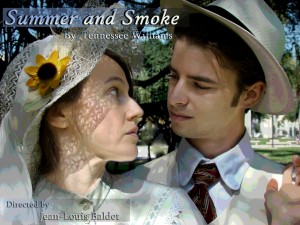
Elizabeth Price, a grad student studying theater, awaited her moment of vulnerability in front of a crowd of strangers backstage last Saturday night.
Nov. 10 was the second night FAU’s Department of Theatre and Dance presented Tennessee Williams’ “Summer and Smoke.”
Price plays Alma Winemiller, a Mississippi minister’s moral yet distressed daughter who fights for her beliefs as an outcast.
While other people her age spend their nights gambling, partying and having careless sex, she believes there’s more to life. She is a troubled, fearful and uneasy character to play. It required a lot of strength for Price to open up to this role. “I definitely had a hard time unwinding,” Price said. “I carry some of her feelings away with me.”
The show’s set design, created to represent the 1900s, made the show stand out. Each area and design on the stage served a purpose. The props were either used in choreography, or mentioned by the characters. Only a select few of the props were there simply to dress up the scene.
The design was well put together, giving the stage an old fashioned look with the dated decor of a brown leather sofa and an antique rotary dial telephone. The furniture had a vintage style to it with mostly old fashioned brown and red tones.
“[The] set design was pretty nice,” Tyler Bourque, freshman computer engineering major said. Inside the small room of the Studio One Theatre, in the College of Arts and Letters, a large angel statue sits on the stage. This gray, stone-textured fountain separates the two contrasting main characters as it sits between their homes.
“I love how they incorporated two houses and the fountain together,” Bourque said.
The set features the home of the uptight Alma Winemiller and the home of John Buchanan Jr., a doctor’s whimsical yet unmotivated son.
Once the show begins, Alma is introduced to an audience of about 100 people. She quickly becomes not just an actress on a stage, but someone the audience can relate to and truly feel for. In one scene, as the man of her dreams, John, approaches her and speaks to her, something in her changes and she gets nervous and excited, giggling and smiling more than she normally would. This causes her to act quirky and goofy for her crush, but also sad and timid in that she may get rejected.
“I felt sad as Alma was so close to being with John,” Bourque said. “Yet she couldn’t, due to the fact that John did not view a relationship like Alma did at that time.”
The audience is introduced to John as he lights a firecracker and throws it behind Alma. The sound effect was realistic, loud and shocking due to the crew using a real firecracker. The audience jumped in their seats with surprise. Alma’s reaction of fright to the sound of the firecracker exploding onto the ground reflected the audience’s. For a quick moment, it seemed like the audience became one with Alma, feeling her alarm.
Although the play begins lightly as the audience meets the main characters, it progressively delves deeper into Alma’s character. The crowd discovers the nerves she faces on a daily basis and how they interfere with her life. They prevent her from relating to others and from having the close bond with her neighbor, John, that she wishes to have. She doesn’t desire a quick fling, but an everlasting romance.
“[Alma] really wears her heart on her sleeve,” Price said. “She does feel very deeply and she doesn’t close herself off.”
Some of the emotions Price had to confront in this role were the vulnerability, fear and misfit nature of Alma. Two weeks before the show began, she overcame one important aspect of becoming her character onstage — opening up. “It helped me experience the world in a more open way,” she said. The process and preparation of putting together the show and being completely vulnerable to the audience has given Price, what she said to be, the best theatrical experience she’s ever had.
“It was an incredible challenge but I really grew as an artist,” she said. “This role is a demanding role in the text and also a demanding role emotionally.”
Along with Price, co-star Abby Perkins, senior and fine arts major, faced a challenge playing Rosa Gonzales (the girl John was sleeping with in town). The role requires a thick Mexican accent, which Perkins found intimidating. Working with Kathryn Johnston, one of the theatre performance instructors specializing in dialects and voice work, and surrounding herself with Mexican culture helped her in becoming her character — accent and all.
“I researched the lifestyle of a young girl in this time and things she would have been interested in,” Perkins said. “I listened to a lot of traditional Mexican flamenco music and took a flamenco class.”
The costume design in the play was well done, portraying how Alma feels about Rosa Gonzales. While all the other characters are dressed up in similar clothing, with mostly neutrals or light colors, Rosa Gonzales stands out wearing dark colors and holding a gothic-looking parasol.
“Summer and Smoke” leaves the audience with a parade of emotions from beginning to far after the play has finished.
Tickets for “Summer and Smoke” are available here. The performance is running from now until Nov. 18, in the Studio One Theatre.













